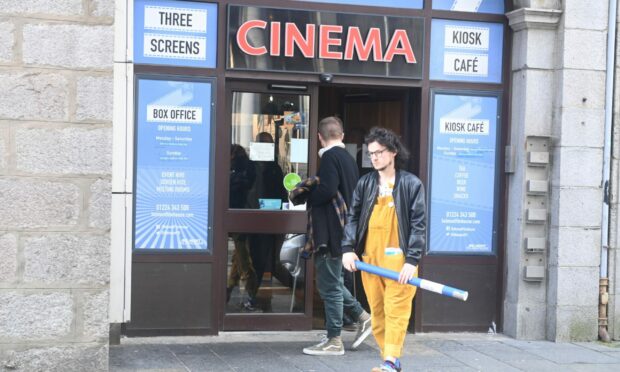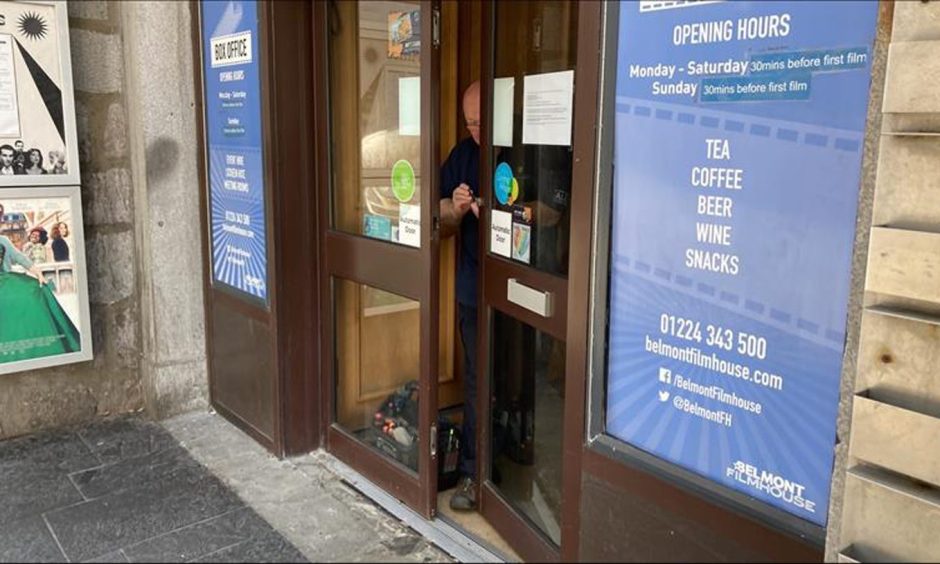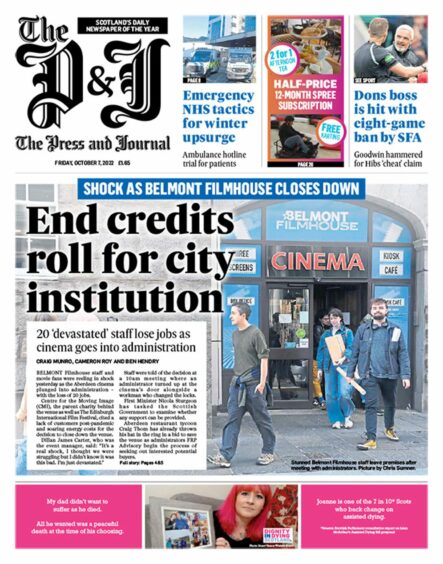The charity behind Belmont Filmhouse warned the government about the risk of its closure almost a month before it went into adminstration, it has been claimed.
Screen Scotland tonight claimed that Centre for the Moving Image (CMI) told the Scottish Government and its quango Creative Scotland about its concerns of insolvency on September 15.
A public funding bail-out was ruled out last week after concerns about the long-term sustainability of the charity were raised.
The Belmont in Aberdeen and the Edinburgh Filmhouse stopped trading after CMI was plunged into administration on Thursday.
Staff gave no warning
More than 100 staff across the organisation were made redundant – including 20 in Aberdeen.
Belmont staff were kept in the dark until a workman turned up on Thursday morning to change the locks – leaving staff “devastated”.
Many of the front-of-house staff were young students who had worked at the cinema for less than a year, meaning they did not qualify for redundancy pay.
As they left staff left wrote messages on the box office wall saying they “loved it to the very end”.
Creative Scotland in talks with CMI
Screen Scotland, which is part of arts agency Creative Scotland, was in contact with CMI throughout their financial difficulties.
A spokeswoman for the government body told the Scotsman: “The CMI executive and board has been responsible for the running of CMI, the business decisions it took, and the organisation’s responsibilities to CMI staff and audiences.
“The CMI contacted Creative Scotland on September 15 stating that they were facing significant financial challenges threatening the viability of the business.
“The CMI also informed Creative Scotland that they were taking advice from insolvency experts.
“CMI provided a summary of the position and some financial information to Creative Scotland on September 19 and Creative Scotland met with the organisation on 20 September, and again on 26 and 27 September.
CMI faced ‘underlying structural challenges’
“Creative Scotland’s board were briefed and met on 3 October to discuss the situation and confirmed funding remained available if the CMI could demonstrate ongoing viability.
“The CMI and its professional advisors had continued to assess and discuss the financial position but concluded that there were no available options, or time, in the current financial climate to change the underlying structural challenges of the business, or the longer-term prognosis.
When the charity went into administration they said the biggest problems were energy prices, payroll costs, lack of public funding, inflation and cinema admissions running at 50% of pre-pandemic levels.
Screen Scotland added: “CMI informally tested the prospect of additional funding with Creative Scotland when we were informed of the severity of their financial challenges mid-September.
“We understand it was similarly tested with Aberdeen City Council and City of Edinburgh Council. Creative Scotland indicated further funding was unlikely. No formal request was made.”
The CMI board then met on October 3 and began to formally appoint administrators.
North-east rallies to save Belmont
Despite CMI going bust, the north-east has rallied to save the Belmont.
On Saturday, hundreds gathered at an Aberdeen bar for a public meeting on how to save the Belmont.
In attendance were political leaders from all over the city. Some were suggesting the cinema be placed into community ownership.
Entrepreneurs such as Craig Thom from the Faffless cafe have already put their names forward to run the Belmont.
Over 17,000 people have signed a petition to save the Belmont and Edinburgh International Film Festival online.
Scottish Government response
A Scottish Government spokeswoman said: “The CMI contacted the Scottish Government in September and were advised to first speak with Creative Scotland as the funding body responsible.
“The Scottish Government is engaging with Creative Scotland as well as Aberdeen and Edinburgh City Councils to provide support where possible.
“The Scottish Government is in regular dialogue with the culture sector, which has been clear that the impact of rising costs are significantly hampering its ability to recover following the pandemic.”





Conversation